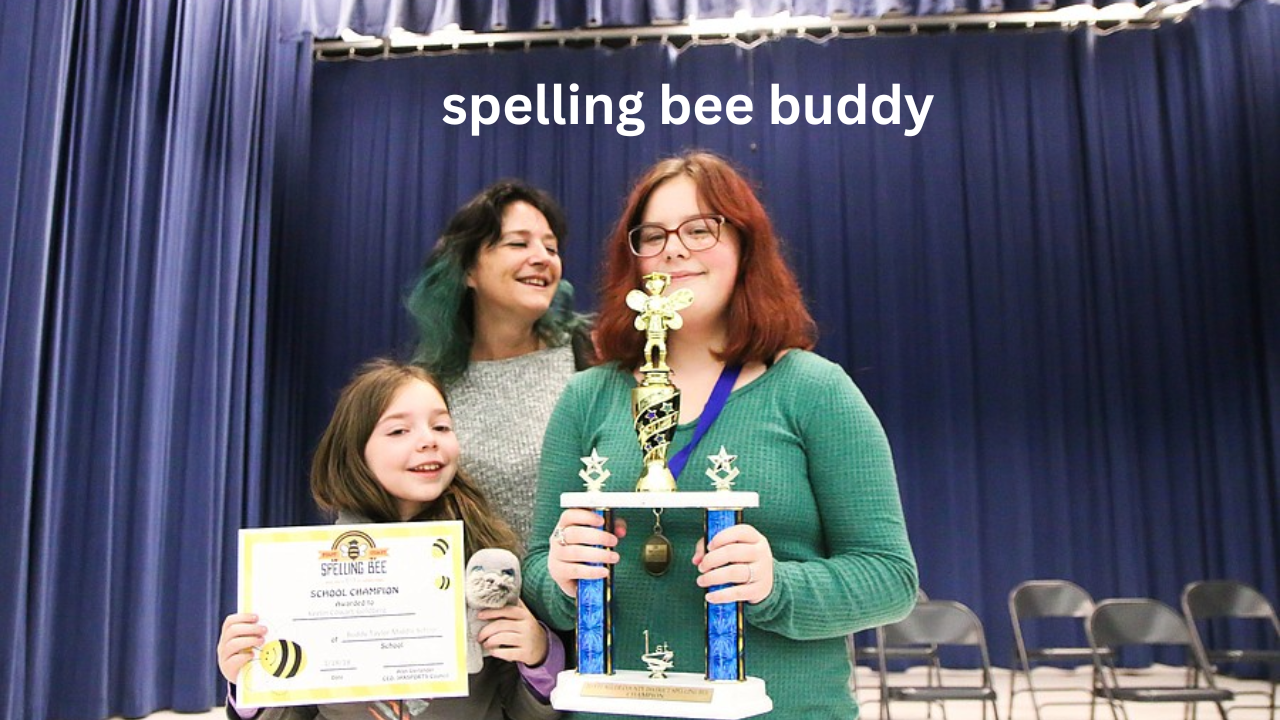Spelling bee buddy are more than just academic contests — they are a celebration of language, memory, and poise. For many students, participating in a spelling bee is both an exciting challenge and a formidable task. With so much to learn, from word etymologies to pronunciation nuances, preparation can feel overwhelming. That’s where a Spelling Bee Buddy comes into play.
This article explores the innovative concept of having a buddy system to support spelling bee preparation. Whether you’re a student, parent, or teacher, understanding how this simple yet effective approach works can make all the difference in achieving spelling excellence.
What is a Spelling Bee Buddy?
Definition and Concept
A Spelling Bee Buddy is essentially a partner — a peer, mentor, or even a digital assistant — who works with a contestant to prepare for spelling competitions. The idea is rooted in collaborative learning, where two individuals support one another’s progress through practice, feedback, and mutual encouragement. This method isn’t just effective academically; it also adds a layer of social support that can enhance learning outcomes and emotional readiness.
Think of it as the study buddy of spelling competitions. Unlike isolated practice, working with a buddy encourages dialogue, critical thinking, and interactive memorization techniques. Whether you’re spelling out words from a list or engaging in rapid-fire drills, having someone to practice with fosters consistency and focus.
How It Works
A spelling bee buddy system works by setting up regular practice sessions where both participants test each other, discuss word meanings, and simulate competition environments. The relationship can be structured based on the goals of the participants — some may opt for daily drills, while others prefer weekly sessions.
The interaction can be either face-to-face or virtual, depending on availability and preferences. The key is to build a rhythm that promotes learning while keeping the sessions engaging. This structured, goal-oriented collaboration not only improves spelling proficiency but also sharpens pronunciation, vocabulary, and confidence.
Types of Buddies
There are various types of spelling bee buddies. A peer-to-peer setup is common in schools, where classmates or friends pair up to prepare together. A mentor-mentee relationship involves an older or more experienced individual guiding a younger participant. This is particularly helpful when preparing for advanced-level competitions.
With advancements in technology, digital buddies — AI-based apps and platforms — can also simulate real-time interactions. These tools often offer interactive quizzes, pronunciation practice, and progress tracking features. Whether human or digital, the buddy approach personalizes learning and encourages sustained motivation.
Benefits of Having a Spelling Bee Buddy
Enhanced Learning Through Collaboration
Collaborative learning has long been proven effective in educational settings. When preparing for a spelling bee, repetition and recall are crucial. Practicing with a buddy allows for constant back-and-forth that reinforces memory and comprehension. It also allows learners to hear words pronounced in different accents, discuss etymology, and tackle tricky words from multiple perspectives.
Moreover, spelling buddies often come up with creative ways to learn — like rhyming games, memory challenges, and story-based word associations. These techniques aren’t just effective; they make the learning process enjoyable.
Motivation and Accountability
Staying motivated during months of spelling bee preparation can be tough. A buddy system introduces accountability. When someone is relying on you to show up and practice, skipping sessions becomes harder. Buddies motivate each other, track their shared progress, and cheer each other on.
Knowing you’re not alone in the journey adds a psychological boost. The shared experience makes it easier to push through difficult words and long practice hours, while also building discipline and time management skills.
Reduced Anxiety and Improved Confidence
Stage fright and anxiety are common during spelling bees. Practicing regularly with a buddy can simulate the pressure of a real competition in a safe and friendly environment. This repeated exposure helps participants become more comfortable with speaking aloud, spelling under pressure, and handling mistakes with grace.
Confidence builds over time, and a spelling buddy serves as a constant reminder that improvement is possible. By celebrating small wins together, participants feel more prepared and empowered on the actual competition day.
Social and Communication Skills
While the main goal of a spelling bee buddy is to improve spelling performance, the system also fosters valuable life skills. Buddies learn how to communicate effectively, provide constructive feedback, and collaborate toward a shared objective.
These interpersonal skills are essential for personal and academic growth. Children who engage in buddy systems often develop stronger relationships, greater empathy, and a deeper appreciation for teamwork — qualities that go far beyond the world of spelling.
How to Find or Become a Spelling Bee Buddy
Finding the Right Match
Finding a spelling buddy isn’t difficult if you know where to look. Start with schools, where teachers can help pair students based on skill level and personality. Libraries and community centers often host literacy programs where such partnerships naturally form. Online forums, spelling websites, and social media groups dedicated to spelling bees are also great places to connect with potential buddies.
When choosing a buddy, look for someone with a similar commitment level, a compatible schedule, and a positive attitude. A good buddy is supportive, consistent, and willing to grow together.
Setting Goals and Expectations
Once you find the right buddy, it’s important to establish shared goals. Whether you’re aiming to qualify for a regional bee or just improve vocabulary, setting clear objectives helps keep both partners focused.
Agree on practice frequency, session length, and preferred learning tools. Use SMART goals — Specific, Measurable, Achievable, Relevant, and Time-bound — to track progress efficiently. This not only boosts productivity but also ensures that both partners remain aligned throughout their journey.
Tools and Resources for Spelling Bee Buddies
There’s a wide range of tools that buddies can use to enhance their practice sessions. Traditional options include flashcards, vocabulary notebooks, and official spelling bee word lists. Digital tools like Quizlet, Merriam-Webster’s Learner’s Dictionary, and spelling apps provide interactive and customizable learning experiences.
Buddies can also create mock quizzes, timed challenges, and themed spelling tests. Recording sessions or using online whiteboards during virtual meetings can further enrich the practice environment.
Virtual Spelling Bee Buddy Setups
In today’s digital age, geography is no longer a barrier. Virtual spelling bee buddies can connect over Zoom, Google Meet, or apps specifically designed for collaborative learning. Use shared documents or apps to track words, score quizzes, and share new discoveries.
Ensure that sessions are distraction-free and interactive. Add variety to keep things fun — such as word games, pronunciation battles, or weekly vocabulary themes. A successful virtual setup hinges on consistency, engagement, and clear communication.
Activities and Strategies for Spelling Bee Buddies
Interactive Practice Techniques
Engagement is key when studying for spelling bees. Buddies can organize mock bees, switch roles as pronouncers, or even involve family members to play judges. Time-bound challenges add a competitive edge that mimics the real event, helping learners stay sharp.
Other ideas include Scrabble-style competitions, word relay games, and spelling charades. These activities not only test knowledge but improve reaction time and reinforce word memory in creative ways.
Building Vocabulary Together
A strong vocabulary is the backbone of spelling bee success. Buddies should work on categorizing words by theme — science, mythology, foreign origins, etc. Exploring the roots and usage of words in context deepens understanding and retention.
Create weekly vocabulary challenges where each buddy introduces a new set of words and teaches it to the other. This teacher-student swap promotes mastery while reinforcing both spelling and meaning.
Tracking Progress and Celebrating Milestones
Progress tracking keeps the learning journey goal-oriented. Maintain a shared logbook or spreadsheet to monitor how many words are mastered, which ones need more work, and how test scores evolve over time.
Celebrate milestones with rewards — small treats, certificates, or even “spelling bee movie nights.” Recognizing progress, no matter how small, builds morale and encourages consistency.
Preparing for the Big Day
As the competition nears, buddies can simulate full-length bees, complete with introductions, rules, and elimination rounds. Review word origins, pronunciation rules, and commonly misspelled words.
Discuss coping strategies for stage fright and last-minute review plans. Help each other stay calm, organized, and focused — just like a real teammate would.
Conclusion
A Spelling Bee Buddy can transform the often solitary and stressful process of spelling bee preparation into an engaging, collaborative, and empowering experience. With the right match, tools, and strategies, buddies can boost each other’s performance, build confidence, and even form lasting friendships.
Whether you’re preparing for a classroom competition or aiming for the national stage, don’t go it alone. Find a buddy, set your goals, and let the learning journey begin — together.
Frequently Asked Questions (FAQs)
Q1: Can siblings be effective spelling bee buddies?
Yes! Siblings often have similar routines and can practice more frequently. However, it’s important that the dynamic remains positive and not overly competitive.
Q2: Are there apps or websites to help connect with a spelling bee buddy?
Yes, platforms like Quizlet, SpellingCity, and various education forums offer ways to find or simulate buddy systems online.
Q3: How often should spelling bee buddies practice together?
At least 2-3 times a week is recommended for consistent progress, but this depends on the competition timeline and individual goals.
Q4: What if one buddy is more advanced than the other?
That’s perfectly okay! The more advanced buddy can take on a mentoring role, which reinforces their own knowledge while helping the other improve.
Q5: How can parents or teachers support the buddy system?
They can help with scheduling, provide resources, and encourage positive communication between buddies.
You May Also Read: https://infonewsblaze.com/voltex-heated-vest/






